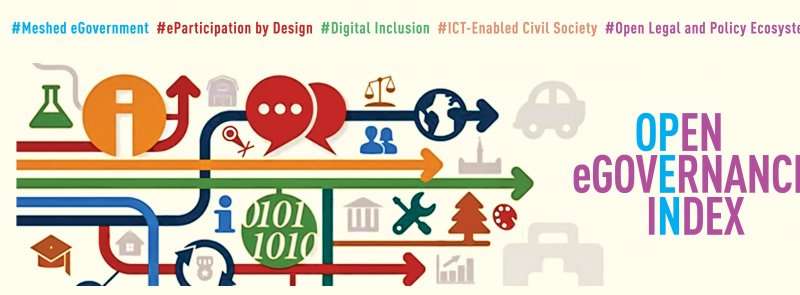By Lilian Nalwoga |
The Uganda government has identified Information and Communication Technology (ICT) as one of the key drivers of socio-economic transformation in the country. This is evidenced in its presence as a priority in national development frameworks such as Vision 2040 and the National Development Plan II (NDP II) which spans from 2015 to 2020.
Extension of the National Broadband Infrastructure (NBI) which to date has connected a total of 133 Government Ministries, Departments and Agencies (MDAs) sites out of which 94 are currently utilising internet delivered over the NBI. Further the NBP II also prioritises the construction of incubation hubs and ICT parks.
These frameworks have recently been measured for the level of governmental openness they enable. Open e-Governance is measured in terms of the ability of the different actors in the internet access eco-system , including governments, business and civil society, to participate in decision-making processes through the use of information and communication technologies.
In March 2017, CIPESA conducted a study into the State of Open eGovernance in Uganda. The study forms part of the Open e-Governance Index (OeGI), an action-research project implemented by the Foundation for Media Alternatives (FMA) `that aims to measure the state of ‘openness’ in the implementation of ‘e-governance’ around the world.
The OeGI index comprises four key dimensions which are measured for different qualities with the highest score being 1 a dimension can score. The study revealed that the dimension Uganda scored highest in was digital inclusion at 1.00 and scored lowest in the dimensions on meshed eGovernment, eParticipation channels and ICT empowered civil society respectively.
Dimension and Country Index Scores
| Dimension | Description | COL | IND | PAK | PHI | UGA | Average |
| Meshed eGovernment | The ability of governments to provide citizen centric online services. | 0.92 | 0.54 | 0.38 | 0.72 | 0.35 | 0.58 |
| eParticipation | new, digital medium for public participation | 0.51 | 0.82 | 0.32 | 0.65 | 0.36 | 0.53 |
| Digital Inclusion | Presence of policies and programs that support the public’s wider use of ICT | 0.83 | 0.50 | 1.00 | 0.33 | 1.00 | 0.73 |
| ICT empowered civil society | ICT readiness and utilisation CSOs and other non-State organisations such as political parties and people’s organisations. | 0.63 | 0.54 | 0.71 | 0.75 | 0.39 | 0.60 |
| Enabling / constraining environment | Extent that the government recognizes and fosters the right to freedom of expression, right over personal communication, cultural freedom and the use of local languages government’s ability to place its public functions online, which comprises many aspects of ICT enablement. | 0.81 | 0.78 | 0.63 | 0.63 | 0.78 | 0.73 |
| Average | 0.74 | 0.64 | 0.61 | 0.62 | 0.58 | 0.64 |
In terms of Meshed eGovernment, Colombia scored the highest at 0.92, followed by the Philippines at 0.72, Indonesia at 0.54, Pakistan at 0.38 and Uganda at 0.35. In the eParticipation channel dimension, Indonesia had the highest score at 0.82, followed by the Philippines at 0.63, Colombia at 0.51, Uganda at 0.36 and Pakistan at 0.32.
Pakistan and Uganda scored 1.00 in the Digital Inclusion dimension, followed by Colombia at 0.83, then Indonesia at 0.50, and the Philippines at 0.33. In the ICT empowered civil society dimension, the Philippines scored the highest at 0.75, followed by Pakistan at 0.71, Colombia at 0.63, Indonesia at 0.54 and Uganda at 0.39. In the Enabling/Constraining Environment dimension, Colombia scored the highest at 0.81, followed by Indonesia and Uganda both at 0.78, then Pakistan and the Philippines both with a score of 0.63.
Uganda’s highest score in Digital Inclusion reflects the presence of universal access and literacy policies in place, such as the National ICT Policy 2014, Rural Communications Development Fund Policy 2001 and draft broadband strategy although adoption and implementation is still challenge.
Despite, having the lowest average index score of 0.58 out of 1, the study indicates that Uganda is moving towards the right path to implementing eGovernance. This includes a growing number of e- services being offered by public agencies such as e-filling for taxes, presence of enabling laws and policies, some of which are positive for citizen participation, free expression and open governance and a growing use of ICT by both governments and Civil Society Organisations (CSOs).
Nonetheless, slow uptake and uncoordinated implementation of eGovernance across government Ministries, Departments and Agencies (MDAs) is still hampering its full adoption. Thus, more commitment towards adoption of policies especially those focusing on promoting open data, open standards and privacy and data protection is needed.
Full findings of the study can be found here.

